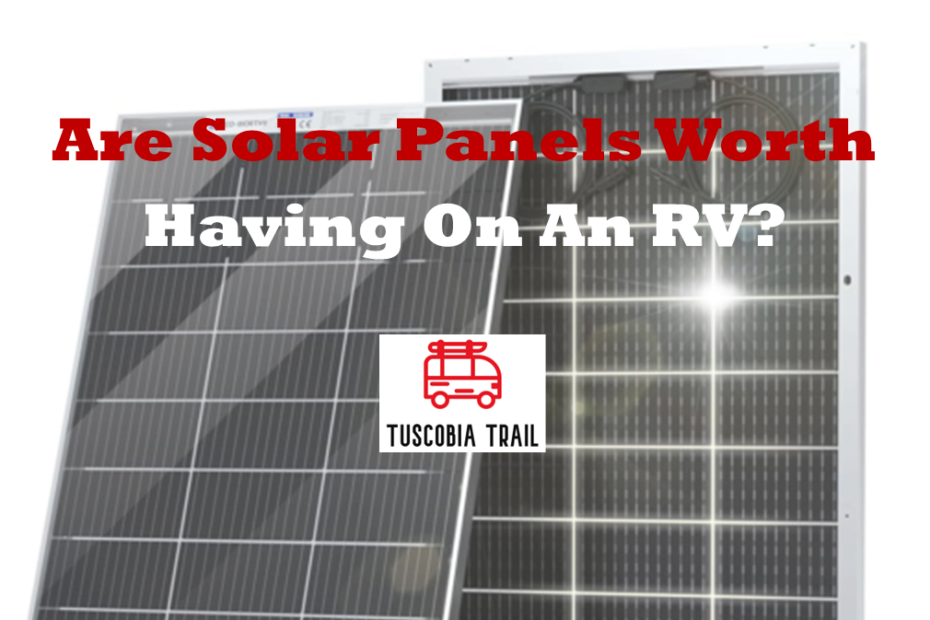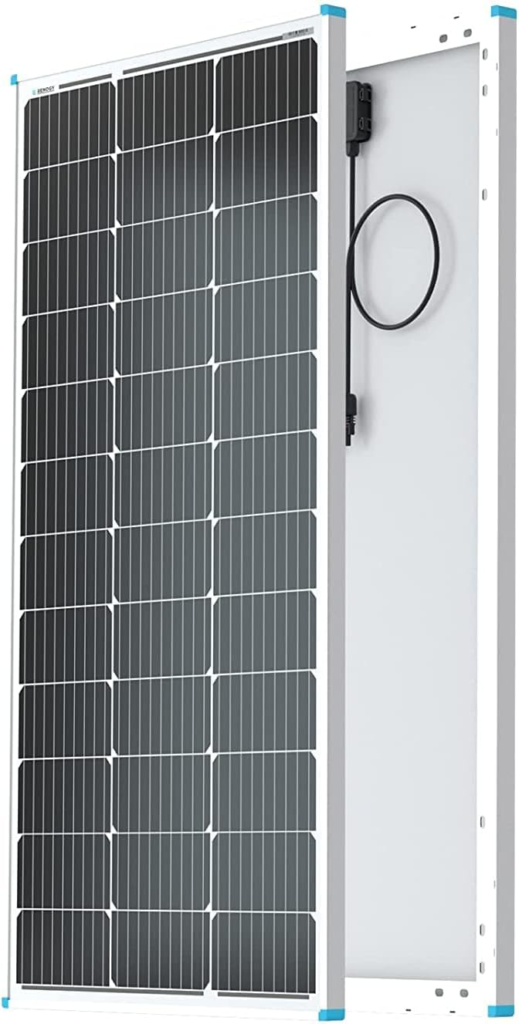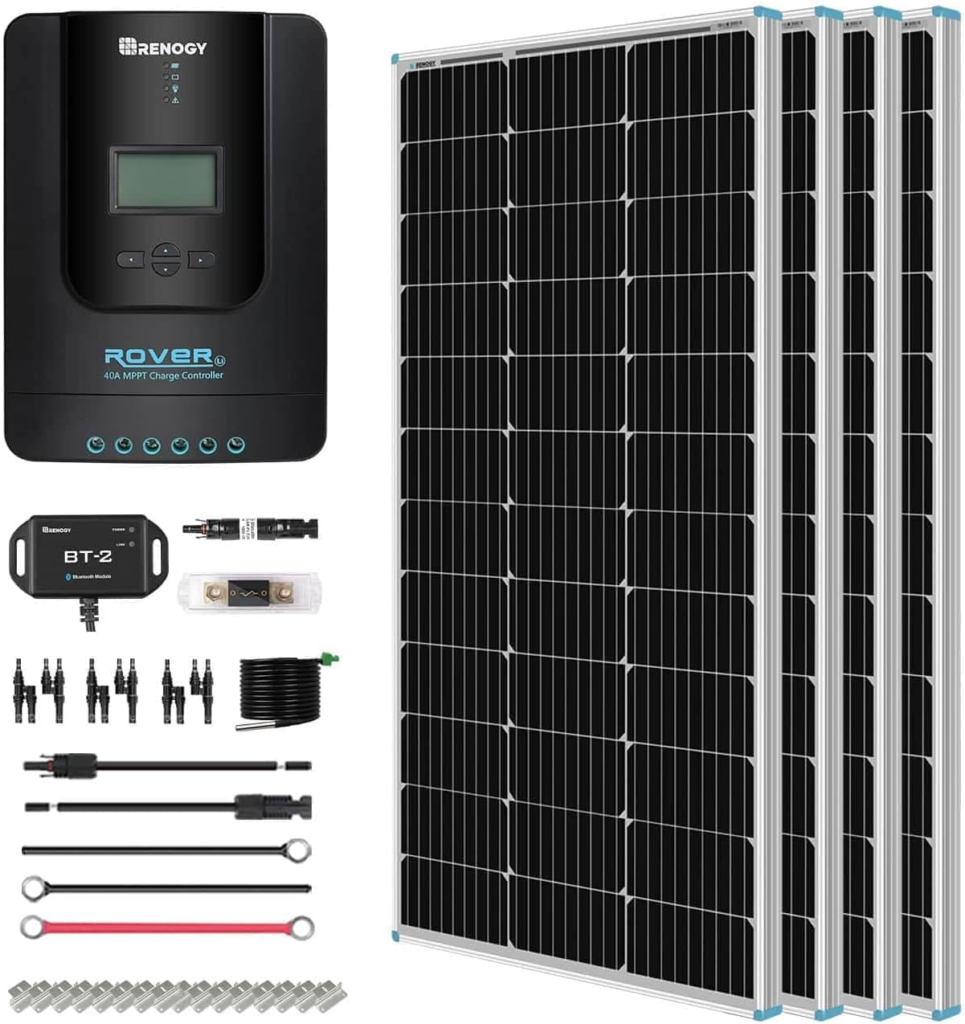Solar panels have become a very popular option for van lifers to use to top up batteries, but are solar panels worth having on an RV?
With advancements in technology, RV solar panels have become a viable and attractive option for those who spend extended periods off the grid.
The investment in solar panels for an RV is particularly worthwhile for avid campers who frequent remote locations.
Not only can this lead to significant cost savings over time, but it also enhances the camping experience and contributes positively to environmental sustainability.
RV Solar Panel Requirements & Benefits
Solar panels for RVs function similarly to those used in residential or commercial settings. They capture sunlight and convert it into electricity, which can be used directly to power devices or stored in batteries for later use.
However, the scale and design of RV solar systems are tailored to the unique needs of mobile living. These systems are typically smaller and designed to be compact, fitting within the limited space available on an RV.
An RV solar setup can generate sufficient power to run small appliances, charge electronic devices, and even support larger kitchen gadgets.
This flexibility means that whether you are parked at a campsite with amenities or boondocking in a remote location, your power needs are covered.
Adding more panels to your RV system is possible, but it’s essential to balance power generation with available storage space.
Investing in RV solar panels offers a cost-effective, convenient, and eco-friendly way to ensure all your devices remain powered, providing peace of mind and enhancing your outdoor adventures.
How are RV Solar Panels installed?
Setting up solar panels on an RV involves several key components:
Solar Panels
The primary component, these capture sunlight and convert it into electricity.
Charge Controller
This device regulates the voltage and current coming from the solar panels to prevent battery overcharging.
Batteries
For storing energy, with popular choices being lead-acid or lithium-ion batteries.
Inverter
Converts the DC electricity generated by the panels into AC electricity used by most household appliances.
RVers can either purchase these components separately to customize their setup or opt for comprehensive RV solar kits.
These kits typically include solar panels, a charge controller, cables, and mounting hardware, and some even come with batteries.
What are the best RV Solar Panel Kits available?
When selecting an RV solar kit, it’s crucial to consider the components included and the overall cost as well as the weight of the panels.
The price per watt generally ranges from $1.15 to $2.50, and the kits often come with all necessary components, though batteries may be an additional expense.
Renogy 100-Watt Solar Kit
This basic kit includes a 100-watt panel, a 30-amp charge controller, and necessary cables. It’s ideal for beginners and can charge a 100-amp-hour battery in about 6-8 hours, making it suitable for light use.
Renogy 400W Complete Solar Kit
If you’re looking to wire solar in your van with the utmost convenience, the Renogy 400W Complete Solar Kit is your go-to choice.
This all-encompassing kit is designed to power your van’s electrical systems efficiently, providing a robust 400W solar panel array that is the heart of your solar power system.
The kit includes lifepo4 batteries known for their reliability and long life, a 2000W pure sine inverter for clean and stable power, and all the necessary wiring, connectors, and fuses. It’s like receiving a power plant in a box, tailored for the unique demands of van life.
Is Solar Worth The Investment?
Investing in RV solar panels can seem daunting due to the initial van life costs, which can exceed $1,500 for high-end setups. The return on investment can be substantial, especially for those who frequently stay off grid.
Replacing a gas generator with a solar setup can result in significant savings on fuel and maintenance costs. Many RVers report recouping their investment within five years, making it a financially sound decision for long-term use.
DIY RV Solar Installation
Installing solar panels on your RV can be a rewarding DIY project. Most RV solar kits are designed for easy installation, with clear instructions and all necessary components included.
While the process involves several steps to ensure all parts work together seamlessly, many users successfully install their systems without professional help.
Limitations of RV Solar Panels
While RV solar panels are highly effective, they do have limitations. Their efficiency drops on cloudy days and during nighttime and over winter months, as they rely on direct sunlight to generate power.
It’s essential to have a backup power source or adequate battery storage to compensate for these periods.
Are Solar Panels worth it?
For those who enjoy off-grid camping, investing in RV solar panels is a smart choice. Solar power not only reduces reliance on gas generators, cutting fuel costs and noise pollution, but also provides a sustainable energy source.
Whether you need power for a few small devices or a full suite of appliances, there’s a solar solution for your RV. Embrace the freedom of the open road with the reliability and eco-friendliness of solar energy.
Solar Panels FAQs
Are solar panels worth the investment for an RV?
For most RV owners who enjoy camping off-grid or boondocking, solar panels are typically worth the investment.
They provide free, renewable energy to power your RV’s appliances and electronics when you’re away from electrical hookups. Solar panels can save money on generator fuel and campground fees in the long run.
How much do RV solar panel systems cost?
A complete RV solar panel system typically costs between $600-$2000, including panels, installation, and electrical components.
Smaller 100-400 watt kits can cost under $600, while larger portable power stations may cost $2,000-$5,000.
What can you power with RV solar panels?
Most RV solar setups are designed to power small devices like phones, laptops, and WiFi routers, as well as some larger appliances like refrigerators.
An 800-watt system can typically run lights, fans, a TV, laptop, and refrigerator for several hours per day.
Do you need a generator if you have solar panels on your RV?
While solar panels can reduce or eliminate generator use in many cases, having a backup generator is still recommended for cloudy days or when you need to run high-power appliances like air conditioners.
How many solar panels does an RV need?
The number of panels needed depends on your power usage, but most RVs use between 100-400 watts of solar panels. A typical RV needs about 120 watts on average, so 3-4 panels in the 100-watt range is common.
Are RV solar panels difficult to install?
Many portable and low-voltage RV solar kits are designed for DIY installation. However, larger residential-style panels should be professionally installed due to higher voltages.


